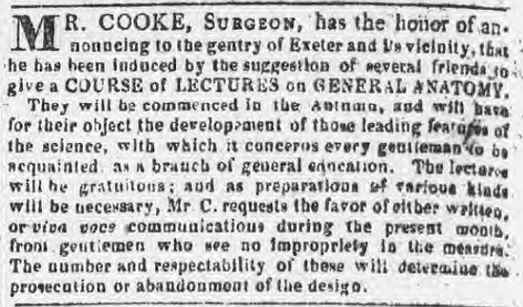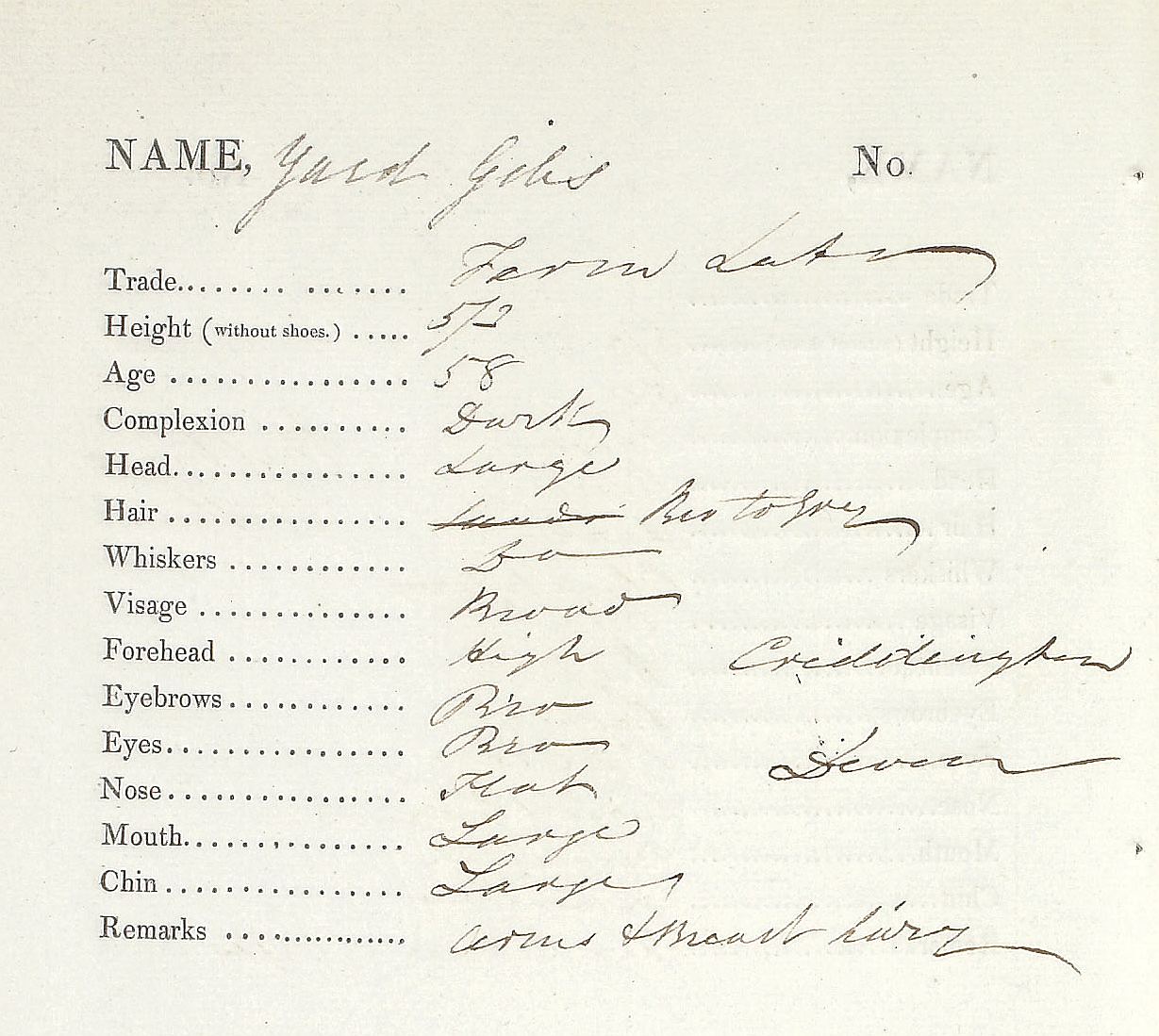Giles Yarde
Born in Crediton in 1782, Giles Yarde married Ann Stadden of Upton Pyne when he was 20. They then moved to Exeter where they had at least four children.
In 1817 he was a farm labourer, living in Friernhay Street in Exeter.
In 1823 he was remanded in custody on a charge of violently assaulting his wife; however the case appears to have been dropped.
On Thursday morning 9th November 1826 it was revealed that an “outrage of the most revolting nature had been committed during the night in St David’s churchyard, Exeter by the disinterment of the body of Elizabeth Taylor, 67 years of age, buried the preceding afternoon”.
[Elizabeth Taylor, nee Bulled, had been previously married to James Gerred, by whom she had a son, Thomas. After her husband died she married William Taylor in 1800.]
The grave was open, the coffin lying on its side, the upper side having been forced from the screws and turned up, part of the cover ripped and turned back, and a sheet, in which the body had been wrapped, with a cord, supposed to have been used in dragging the body from the grave, laying by;-there were evident marks of the body having been taken over the wall at the north-east angle and into the fields beyond. Taylor, the officer was immediately put on the alert and soon apprehended Giles Yarde, he also obtained such positive information, that the Magistrates issued a warrant for searching the house of Mr. Wm. Cooke, surgeon, 116, St. Sidwell-street. Mr. E. Ellis, one of the corps of constables, accompanied Taylor in the search, and on informing Mr. C. of the object of their visit, he said 'You will proceed immediately- you are sure to find it-it is useless to deny having it ;" and then accompanying them to the top of the house, unlocked the door of a room, where the body, partly dissected, was laying on a board placed on a table. At a subsequent search by the same officers, assisted by Messrs. Wilmott, F Chapple and Rodd, constables, the grave-clothes of the deceased were found in an aperture between the ceiling and the roof, and afterwards sworn to by the relatives and the nurse. Mr. Cooke was taken into custody, and after an examination (during which he was attended by Mr.C. Brutton) admitted to bail, himself in £200 and two sureties in £100 each, to appear and answer at the Sessions such indictment as shall then be preferred against him. Yarde was remanded for further examination.
At the Exeter City Sessions held on 16 January 1827 Cooke successfully applied to have judgement of his case determined by the King's Bench in London. He later stated that this was because of "the effect of popular prejudice".
At a hearing in Exeter in March the following additional information came to light: Christian Jones was present at the death of Elizabeth Taylor; she saw her put in the coffin, where she was till the time of her funeral; saw her carried out to be buried. Cross examined: she had on when buried a cap, a white handkerchief on her neck, a shift, a bed gown, and a pair of white cotton stockings with a T on them.
Thomas Jerrard examined - I am the son of the deceased, and I followed her to her grave; she was buried in St David’s churchyard in this city. In consequence of what I had heard I went the next morning- at 7 o’clock it was hardly light, and found the grave open. The coffin was also open, and the body gone—there had been a frost in the night, and I found tracks towards Mr. Cooke's house - I afterwards went for warrant to search his house—l went with the officers there between 10 and 11 o'clock—l saw two persons there, one of whom I believe was Mr. Cooke—the constables went into the house first—l went up stairs, being sent for, and saw the body of my mother on the table, it was covered with a cloth.
John Taylor—l am a constable, and apprehended the defendant, Yarde, who lives in St. Mary Arches Lane. On going to his house I saw him and his son [John]—his son had a spade—it had the appearance of having been used lately—there was earth on it the same kind as that in St. David's Church - I took notice of his shoes—l went afterwards to the Church Yard, and saw the foot marks, which went to the north east corner; the shoes had nails; compared the shoe with the tracks, and the nails fitted. ---- Reynolds: I am sexton of St. David's; I remember Mrs Taylor being buried; the grave was filled up the same night; left about a quarter before 6 o'clock; I saw Yard about halt past four walking backwards and forwards; the funeral took place about 5 o'clock it was not quite dark; it was moonlight; went the next morning, and found the coffin nearly on one side, and all the earth out the grave; the bran was on the outside of the grave, and the body gone; I observed the tracks and heavy footsteps.
The King's Bench hearing took place in London on Thurs May 17. Yarde remained in Exeter Gaol as he couldn't afford to appeal.
Cooke put in an affidavit:
It stated that about a year ago, he, having finished his medical studies at Paris, returned to this country, and settled at Exeter, where be proposed to give a course lectures on the anatomy of the human body.

He having advertised a lecture on the muscles for the 9th of November, made many unsuccessful efforts to obtain “a subject," and it being impossible for him to lecture without a subject, applied to the other defendant to go to the church-yard to get a body. He gave particular instructions to Yarde not to bring away any of the grave clothes, and to raise the body the most decent manner possible. About four o'clock in the morning of the 9th November, Yarde brought the body to his (deponent's) house, and the deponent ordered him immediately to return, and fill up the grave; but Yarde having neglected to do so, and the grave having been found open next morning, the body was traced to his house, and he (defendant) was dragged before a magistrate, and charged with felony, and a great prejudice was excited against him in the minds of the inhabitants. His object in procuring the body was the promotion of medical science, and as his intention was not to offend the slightest degree the feelings of the public, or the relations the deceased, he had given the strictest orders that the disinterment should be conducted in the most decent manner possible, and therefore, for the other defendant's neglect in leaving the grave thus indecently open, he (Cooke) ought not to be blamed.
The affidavits of Drs. Abernethy, Blackall, and Tucker, were put in and read. They stated that the defendant had been the pupil of Mr. Abernethy; that he was a gentleman of great medical talent; that he had passed the College of Surgeons with great credit, and that he was of humane disposition.
The Court, taking all the circumstances of case into their consideration, ordered and adjudged, that the defendant pay to the King a fine of £100.
William Cooke (1802 - 1834) later explained that he came to Exeter in March 1826 as a perfect stranger having been induced to leave his native county Stafford by threatening symptoms of phthisis, and directed to Devon as a warm part of the island by the same unwelcome monitor. Finding himself a good deal at leisure, he determined to consult some gentlemen of Exeter with whom he had become acquainted respecting the expediency of adopting a plan that he had long reflected upon, namely that of giving a course of anatomical lectures to gentlemen of any profession who might be inclined to study anatomy as a branch of general science. The suggestion was warmly approved and he commenced in October with the pleasure of addressing about fifty gentlemen among whom were medical practitioners and students, reverend gentlemen, attorneys, artists and others of like respectability.
It was at this point that, being unable to procure a body from contacts in London, he approached Giles Yarde.
After nine months' confinement without being tried, Yarde was eventually released from Exeter Gaol after petitioning William Sturges Bourne who was briefly Home Secretary.
In 1830, just after Ann his wife had died, Giles Yarde was convicted of stealing wearing apparel and sentenced in Exeter to eight months in gaol, with one week of each month in solitary confinement.
Then in June 1837 he was found guilty of stealing a reaping hook (scythe) off John Cook on 7th April in Clyst St Mary. In view of his previous offence he was then sentenced to be transported for seven years. He arrived in Tasmania on Moffatt II in April 1838.

Yarde's not very flattering convict description states that his native place was "Criddington, Devon"
On arrival in Tasmania he was assigned to work for Richard Lewis, a dairy farmer in Hollow Tree (now Cambridge) near Hobart.
He gained his certificate of freedom in 1844, and died, aged 77, in Campbell Town, Tasmania in 1859.
by Peter Selley
